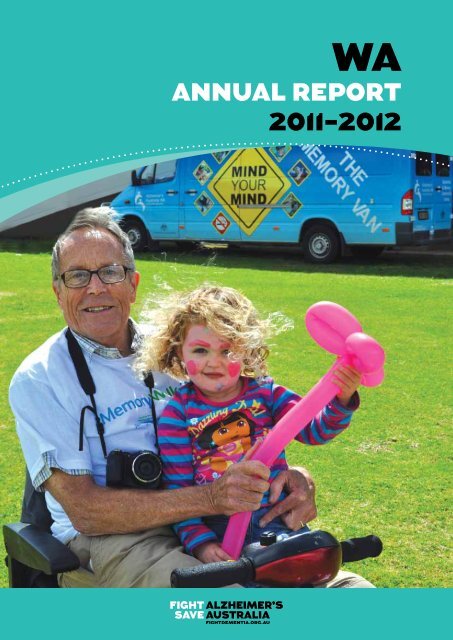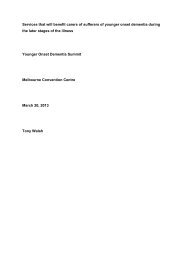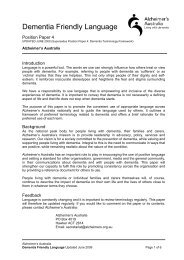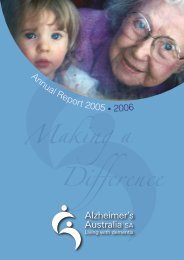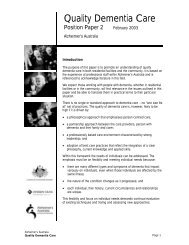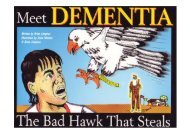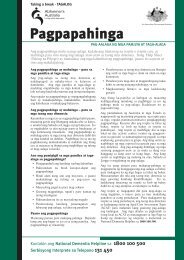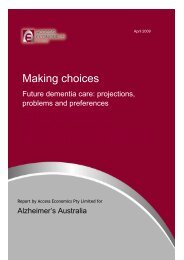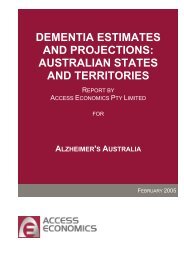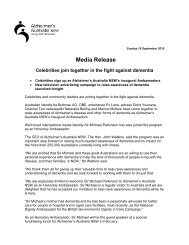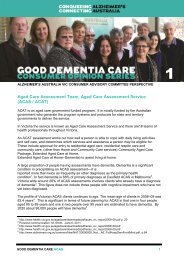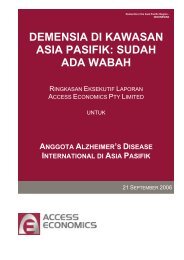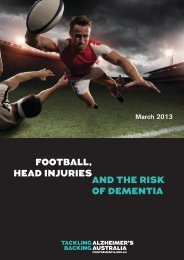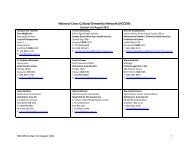ANNUAL REPORT 2011â2012 - Alzheimer's Australia
ANNUAL REPORT 2011â2012 - Alzheimer's Australia
ANNUAL REPORT 2011â2012 - Alzheimer's Australia
Create successful ePaper yourself
Turn your PDF publications into a flip-book with our unique Google optimized e-Paper software.
WA<br />
<strong>ANNUAL</strong> <strong>REPORT</strong><br />
2011–2012
CONTENTS<br />
Chairman’s Report 2<br />
Board of Directors 6<br />
Medical Director’s Report 8<br />
Research Report 10<br />
Our Performance in 2011–2012 11<br />
Our Corporate Supporters 12<br />
Thank you for your Generosity 13<br />
Our Volunteers 14<br />
We are here… for the community 16<br />
Our Members and Supporters 18<br />
The year in review 20<br />
Directors’ Report 22<br />
Auditor’s Independence Declaration 25<br />
Directors’ qualifications, experience<br />
and special responsibilities 26<br />
Statement of Comprehensive Income 27<br />
Statement of Financial Position 28<br />
Statement of Recognised Income<br />
and Expenditure 29<br />
Statement of Cash Flows 30<br />
Notes to Concise Financial Report 31<br />
Directors’ Declaration 33<br />
Independent Auditor’s Report 34<br />
Disclaimer<br />
Articles in this publication provide a general<br />
summary of the subject matter covered. Any<br />
person with dementia should seek professional<br />
advice about their specific case. Alzheimer’s<br />
<strong>Australia</strong> WA is not liable for any error or omission<br />
in this publication. Permission should be sought<br />
from the Editor before reproducing articles and/or<br />
images. Should permission be given, the source<br />
must be acknowledged.
Vision<br />
A society committed to preventing dementia, while valuing and supporting people<br />
who live with it.<br />
Purpose<br />
To advance the interests of people living with dementia through advocacy, education,<br />
support and research.<br />
Philosophy<br />
Dementia is a human experience rather than just a biological condition. We therefore offer a<br />
holistic approach in our care that respects the individuality of people living with dementia.<br />
Values<br />
• Understanding the unique needs of people living with dementia.<br />
• Recognising people as our greatest strength.<br />
• Investing in partnerships.<br />
• Treating people with respect and dignity.<br />
• Encouraging innovation and creativity.<br />
• Being transparent, accountable and sustainable.<br />
Alzheimer’s <strong>Australia</strong> march on<br />
Canberra on 13 October 2011 marks the<br />
start of our new branding direction.<br />
WA Annual Report 2011–2012 1
Chairman’s Report<br />
On behalf of the members of the Board of<br />
Alzheimer’s <strong>Australia</strong> WA, I wish to report on<br />
the 2011/2012 financial year.<br />
Chairman<br />
Mr Craig Masarei<br />
The release of the 2012 federal budget<br />
saw nearly $270 million allocated to<br />
dementia care over five years as part of<br />
the Living Longer, Living Better reform<br />
package, a welcome development which<br />
validated the time and effort put into our<br />
lobbying campaign.<br />
John Phillimore, Professor Barbara Horner, Professor Jill Downie, Ita Buttrose and Frank Schaper at the<br />
Best Practice and Innovation in Dementia Care breakfast forum in June 2012<br />
The last year has seen us undergo a<br />
prominent rebrand where we have cast<br />
dementia and the stigma attached to it as<br />
a villain, while positioning Alzheimer’s<br />
<strong>Australia</strong> as the hero to combat it. These<br />
branding activities give us a clearer visual<br />
identity, helping to raise awareness for<br />
the essential services we provide to<br />
people in the community with dementia,<br />
and their carers.<br />
Coinciding with the start of our new<br />
brand direction was a protest march on<br />
Parliament House on 13 October 2011.<br />
Nearly 500 people, including<br />
representatives and supporters from all<br />
branches of Alzheimer’s <strong>Australia</strong>, led by<br />
National President Ita Buttrose, marched<br />
to Parliament House to demand the<br />
Federal Government commit $500 million<br />
to address the dementia epidemic.<br />
The campaign continued on Valentine’s<br />
Day, when community members were<br />
encouraged to ask politicians - in the<br />
form of a valentine’s card - to fund<br />
dementia care and research. The cards,<br />
totalling more than 1,600, were sent to<br />
Canberra by Alzheimer’s <strong>Australia</strong>,<br />
prompting responses from both sides of<br />
politics including a written letter from<br />
Prime Minister Julia Gillard.<br />
On 10 August 2012, the Commonwealth<br />
Government declared dementia a National<br />
Health Priority Area, a move which was<br />
universally welcomed and, together with<br />
the funding of aged care reforms, an<br />
opportunity to address key failures in the<br />
health system in regards to dementia.<br />
Work still remains to be done given the<br />
budget’s failure to allocate funding for<br />
research. However, this is something<br />
Alzheimer’s <strong>Australia</strong> and Alzheimer’s<br />
<strong>Australia</strong> WA will continue to fight for.<br />
One of the many highlights for our<br />
organisation this financial year has been<br />
the launch of several new programs. Our<br />
new Client Volunteering Program aims to<br />
improve the self-esteem and quality of<br />
life of people living with early stage<br />
dementia, to provide opportunities for<br />
them to volunteer in the community.<br />
Kanyana Wildlife Rehabilitation Centre<br />
was one organisation that embraced this<br />
pilot program from the outset. And we<br />
are pleased to report that its support was<br />
rewarded when the charity scooped the<br />
prestigious Bethanie Medallion for a<br />
Volunteer Organisation in 2011. The pilot<br />
was a great success and one member of<br />
the program is still volunteering at<br />
Kanyana two years on.<br />
“<br />
Living<br />
The release of the 2012 federal budget saw nearly $270 million<br />
allocated to dementia care over five years as part of the<br />
Longer, Living Better reform package.<br />
“<br />
2 WA Annual Report 2011–2012
In addition, a new major fundraiser -<br />
Dine4Dementia - was launched in June<br />
2012. Raising over $35,000 in its first<br />
year, this initiative is set to become an<br />
annual fixture in the Alzheimer’s <strong>Australia</strong><br />
WA fundraising calendar. More<br />
information about this initiative is<br />
included further on in this annual report.<br />
Also this year, a number of key<br />
partnerships have helped us to assist<br />
<strong>Australia</strong>ns and their families cope with<br />
dementia and improve their quality of life.<br />
One of the partnerships we established<br />
during the last financial year involved the<br />
Alzheimer’s Innovation Institute (AII) in<br />
Calgary, Canada and its Ashby Memory<br />
Method (AMM) program.<br />
AMM is a person-centered, memoryenhancement<br />
program for people<br />
experiencing early to moderate dementia<br />
which helps to manage symptoms.<br />
Based on twice weekly, hour long<br />
interactive sessions facilitated by a<br />
support worker, this program has<br />
consistently received positive feedback<br />
from participants, family carers and<br />
support workers, particularly in regards to<br />
self-esteem and confidence building.<br />
In the past year, Alzheimer’s <strong>Australia</strong> WA<br />
has also partnered with The Bethanie<br />
Group to establish a joint federally-funded<br />
project called ‘My Memory Book’. The<br />
project promotes community awareness<br />
about dementia and involves the<br />
The WA police used their annual Dine-in night for ‘Dine4Dementia’. Pictured are Josh Catalano, Governor<br />
McCusker, Commissioner Karl O’Callaghan and Assistant Commissioner Duane Bell<br />
participation of family carers to document<br />
life stories in conjunction with the person<br />
they care for. The life story book provides<br />
an opportunity for a person with<br />
dementia to reflect on the positive<br />
aspects of their past and to feel<br />
connected. It can be used as a tool to<br />
reduce anxiety when a person is in a new<br />
environment and lacks a sense of<br />
connection. To date the project has<br />
reached 81 people living with dementia,<br />
and their families.<br />
Much work has also been undertaken<br />
this financial year on a capital project in<br />
the City of Albany to develop a new<br />
dementia community house. The new<br />
building will replace our current<br />
Hawthorn House and will provide greater<br />
capacity for quality services within the<br />
Great Southern.<br />
Alzheimer’s <strong>Australia</strong> WA is incredibly<br />
grateful for the support of:<br />
• Lotterywest which has provided a<br />
grant of $407,000,<br />
• The Royalties for Region program, for<br />
a grant of $992,000,<br />
• Health Workforce <strong>Australia</strong>, for<br />
supporting the development of<br />
student space in the new building<br />
with a grant of $146,000,<br />
• The Home and Community Care<br />
(HACC) program which has supported<br />
the project with a grant of $115,000<br />
This project has only been made possible<br />
as a result of the support of the local<br />
community and we are indebted to The<br />
Jack Family Charitable Trust for a donation<br />
of $100,000 and the Albany Hawthorn<br />
House fundraising team who have rallied<br />
the community and raised over $130,000<br />
so far.<br />
Craig Masarei, Glen Jakovich and Frank Alban MLA walk against dementia at the 2011 Memory Walk<br />
Howard & Heaver architects are currently<br />
working on a design for the new house<br />
and we anticipate the commencement of<br />
construction in the New Year.<br />
WA Annual Report 2011–2012 3
Chairman’s Report cont...<br />
learning experiences across a range of<br />
health disciplines. This project, funded<br />
by Health Workforce <strong>Australia</strong>, a Federal<br />
Government initiative, has seen the<br />
development of increased placement<br />
opportunities and partnerships with<br />
Amana Living for occupational therapy<br />
student placements within Amana<br />
facilities.<br />
As well as coordinating Curtin University<br />
student placements we also provide<br />
Notre Dame University nursing<br />
placements and learning opportunities<br />
for medical students from the University<br />
of WA.<br />
Minister for Mental Health and Ageing Mark Butler MP with his creation at the AAWA art therapy<br />
‘Artistic Adventure’ workshop<br />
In other highlights, earlier this year we<br />
welcomed a visit from the Federal<br />
Minister for Mental Health and Ageing,<br />
Mark Butler MP, who attended one of our<br />
art therapy workshops. The Minister was<br />
able to see and hear first-hand the<br />
benefits of our ‘Artistic Adventures’<br />
program for people with dementia at the<br />
Art Gallery of WA.<br />
Initially funded through a Dementia<br />
Community Grant by the Department of<br />
Health and Ageing in 2008, the pilot<br />
project focuses on social inclusion and<br />
the accessibility of public spaces for<br />
people with dementia. The success of<br />
the pilot project led to a partnership with<br />
the Art Gallery of WA to deliver ongoing<br />
gallery tours for people with dementia,<br />
facilitated by specially trained volunteer<br />
guides. Participants were also able to<br />
express their creativity in art sessions in<br />
the Gallery’s studio.<br />
Furthermore this financial year, Art<br />
Therapist Jackie Lewis has helped the<br />
‘Artistic Adventures’ program to continue<br />
to grow, with a dozen couples enrolled in<br />
this innovative, popular program.<br />
Jackie was also involved in the award<br />
winning ‘Project Picasso’, funded by<br />
Amana Living, helping to support the<br />
project by offering training and expertise<br />
to staff and volunteers. Indeed, the six<br />
week program was so successful that it<br />
has now expanded to twelve facilities.<br />
The resulting joint exhibition was held at<br />
Christchurch Grammar School, Claremont,<br />
with works sold by donation. This not only<br />
raised valuable funds, but also the project<br />
won a Mental Health Commission award.<br />
The Government’s recent commitment to<br />
fund dementia services is vital in<br />
ensuring programs for people living with<br />
dementia, such as Artistic Adventures,<br />
can continue and expand.<br />
Throughout this financial year, Alzheimer’s<br />
<strong>Australia</strong> WA has continued to work<br />
closely with a number of universities to<br />
ensure the next generation of health<br />
professionals qualify with a thorough<br />
knowledge of dementia and an<br />
understanding of the latest evidencebased<br />
dementia care practice.<br />
We have formed a collaboration with<br />
Curtin University to provide student<br />
Over the duration of this project<br />
Alzheimer’s <strong>Australia</strong> WA will provide<br />
nearly 3,000 days of dementia-specialist<br />
student placement across the health<br />
disciplines of nursing, OT, physio and<br />
psychology.<br />
Last year Alzheimer’s <strong>Australia</strong> WA, in<br />
partnership with the University of<br />
Wollongong, launched a new project<br />
aimed at translating research into<br />
best-practice design guidelines for<br />
architects and designers of aged care<br />
facilities. The project, a first for <strong>Australia</strong>,<br />
was funded through a National Quality<br />
Dementia Care Initiative grant. It involved<br />
the University of Tasmania, the Dementia<br />
Collaborative Research Centre, Curtin<br />
University’s Centre for Research on<br />
Ageing, renowned dementia-specialist<br />
architects Brian Kidd and Kirsty Bennett<br />
and dementia landscape specialist<br />
Tara Graham Cochrane, in addition to<br />
Queensland-based family carer<br />
Tara Quirke.<br />
The project aims to make a real<br />
difference to the quality and accessibility<br />
of built environments for people with<br />
dementia, with a range of initiatives<br />
being developed. These include<br />
environmental audit tools for care<br />
settings, course materials for university<br />
architectural students, workshops for<br />
professionals and families, a national<br />
library lending resource and a virtual web<br />
based centre of information and advice.<br />
4 WA Annual Report 2011–2012
The guidelines will help shape quality<br />
dementia care in <strong>Australia</strong> for years to<br />
come as the number of people living<br />
with the condition is expected to<br />
increase by almost 50 per cent to<br />
385,000 in just 10 years.<br />
Alzheimer’s <strong>Australia</strong> WA was proud to<br />
launch our 15-unit Certificate IV in<br />
Dementia Practice in the latter half of<br />
2011. This new qualification in <strong>Australia</strong><br />
aims to improve care practices for people<br />
with dementia and consists of one<br />
full-day workshop which must be<br />
attended every three weeks for a period<br />
of 12 months.<br />
The qualification is applicable for<br />
experienced practitioners who are<br />
seeking to develop a greater<br />
understanding and knowledge of<br />
dementia care practices, or who have<br />
moved into dementia-specific service<br />
delivery.<br />
Participants will gain knowledge and<br />
skills in models of best practice in<br />
dementia care and the qualification will<br />
act as a pathway for those wishing to<br />
pursue leadership roles and be innovative<br />
and creative in their workplace.<br />
Participants undertaking this qualification<br />
will be equipped to support their<br />
organisation’s dementia development,<br />
and will have the ability to contribute as<br />
role models for their care team.<br />
Significantly, 2012 saw the departure of<br />
three long serving members of our<br />
organisation. Director Terry Phillips<br />
resigned after 13 years on the Board and<br />
we offer thanks for her many years of<br />
service and wish her well in her future<br />
endeavours.<br />
We also bid farewell and thank<br />
Tonia Zeeman who has been on the<br />
Board for six years and retired in August<br />
of this year.<br />
CEO Frank Schaper also retired after<br />
15 years at the helm. He joined the<br />
organisation in 1996 during a difficult<br />
period in our history and has overseen<br />
tremendous growth, which has led to<br />
AAWA becoming an industry leader. His<br />
work over a decade and a half has laid<br />
the groundwork to enable our<br />
organisation to face the challenges of the<br />
future, and he leaves our not-for-profit<br />
organisation in good shape. We thank<br />
him for his years of service and wish<br />
him all the best in his well-deserved<br />
retirement.<br />
At the same time, we welcome former<br />
State Minister for Seniors Rhonda Parker<br />
as the new CEO of Alzheimer’s <strong>Australia</strong><br />
WA. Rhonda’s experience as the nation’s<br />
first Aged Care Commissioner and her<br />
time on the Aged Care Standards and<br />
Accreditation Agency board make her the<br />
best person to lead the organisation into<br />
the future. Welcome Rhonda.<br />
In closing, the Board, staff and our<br />
volunteers deserve special mention for<br />
their dedication to our organisation. Our<br />
work depends on the enthusiasm and<br />
commitment of so many people, and<br />
sincere thanks go to each and everyone<br />
of them.<br />
Finally our thanks to our sponsors,<br />
donors, supporters and in particular the<br />
<strong>Australia</strong>n Government and the State<br />
Government which continue to provide<br />
the resources necessary to continue our<br />
work, which is so crucial to the many<br />
thousands of West <strong>Australia</strong>ns and their<br />
families who are living with dementia.<br />
Craig Masarei<br />
Chairman<br />
“<br />
such<br />
The Government’s recent commitment to fund dementia services<br />
is vital in ensuring programs for people living with dementia,<br />
as Artistic Adventures, can continue and expand.<br />
“<br />
WA Annual Report 2011–2012 5
oard of directors<br />
Chairman<br />
Mr Craig Masarei<br />
Craig Masarei is the current Chairman of Alzheimer’s <strong>Australia</strong> WA Ltd (AAWA) and has held this<br />
position for the past 13 years. Craig also holds the position of Treasurer of Alzheimer’s <strong>Australia</strong>, our<br />
National body. Craig is the Chief Legal Officer for the Water Corporation and a Director of Water<br />
Corporation Superannuation Pty Ltd.<br />
Vice-Chairman<br />
Mrs Jenny Rogers<br />
Jenny Rogers has been a Board member for seven years and Vice Chair since 2008. She has<br />
worked in the finance industry for 30 years and is currently a director in the management company<br />
- Patersons Stockbroking and Financial Planning. Jenny’s other roles include Chair of the National<br />
Breast Cancer Foundation.<br />
Honorary Treasurer<br />
Mr Nick di Lorenzo<br />
Nick di Lorenzo has been on the Board since 1996 and currently holds the position of Alzheimer’s<br />
<strong>Australia</strong> WA Honorary Treasurer. He has been a partner in the accounting practice of Galluccio and<br />
Griggs since 1988, a company which assists with management consulting and taxation affairs of small<br />
businesses in various industries. Prior to this appointment he worked for a large accounting firm in<br />
Western <strong>Australia</strong>.<br />
Director<br />
Ms Terry Phillips<br />
Terry Phillips has been a Board Member for the last 13 years, and will retire at the AGM in November.<br />
She was a professional social worker employed by a large national organisation as Employee<br />
Counsellor until her retirement two years ago. Her focus on the Board has been ensuring staff receive<br />
the support and resources they have needed to provide an excellent level of service to people with<br />
dementia and their carers.<br />
Hon Medical Director<br />
Dr Sean Maher<br />
Sean Maher is a Geriatrician and Head of the Department of Rehabilitation and Aged Care at Sir Charles<br />
Gairdner Hospital. He previously worked at Royal Perth and Bentley Hospitals in acute geriatric medicine,<br />
rehabilitation, and as part of an Aged Care Assessment Team. He was the Federal Secretary for the<br />
<strong>Australia</strong>n and New Zealand Society for Geriatric Medicine (ANZSGM) from 2008 - 2012 and has been a<br />
Federal Councillor of the society since 2005.<br />
Director<br />
Mr Tony Ramshaw<br />
Tony Ramshaw has been a Board Member since 2006. He retired from his position as Chair of<br />
Alzheimer’s National Consumer Advisory Committee and member of the National Consumer Dementia<br />
Research Network to care for this wife. He spent eight years as a carer for his wife who has dementia<br />
and who now is in residential care. He has previously held managerial positions for an international oil<br />
and gas contractor.<br />
6 WA Annual Report 2011–2012
Director<br />
Mrs Jenny Watt<br />
Jenny Watt’s husband Alan was diagnosed with Alzheimer’s at the young age of 52, 12 years ago.<br />
Initially Jenny looked after him at home for six years, as well as her teenage children, before he was<br />
moved to residential care where he remained for four years until his passing at 63. She recently spent<br />
seven weeks in Melbourne organizing her 65 year old brother’s move into residential care for<br />
dementia, witnessing his rapid decline. Within one week he did not know who she was or what her<br />
name was. Jenny comes from a medical background.<br />
Director<br />
Ms Tonia Zeeman (Retired August 2012)<br />
Tonia Zeeman has spent over 20 years in the public, private and non profit health sector and has broad<br />
experience across aged care, community services, acute care and mental health sectors. Tonia is the<br />
General Manager of all the Services for Older People and Service Development within Brightwater Care<br />
Group. Tonia is also Director on the ACSWA Board and Chairs the Residential Care Sub-Committee<br />
of the ACSWA Board. Tonia retired from the Board in August.<br />
Director<br />
Ms Amanda Mitchell-Lewis<br />
Amanda Mitchell-Lewis has been on the Board since 2010 and has been employed in the Financial<br />
Services Industry for over 25 years in various technical and management roles and currently runs her<br />
own Financial Planning practice. She is passionate about raising the awareness of Alzheimer’s Disease,<br />
dementia and aged care in general for both those affected and their families based on her own family’s<br />
experiences.<br />
Director<br />
Mr Andrew Hogan<br />
Andrew Hogan is the CEO at St. Bartholomew’s House, one of Perth’s leading providers of services<br />
and support to the homeless, a role that he has only recently commenced. The mission of St Bart’s is<br />
to assist in rebuilding the lives of the homeless of today and advocate to prevent the homelessness of<br />
tomorrow. Prior to coming to St. Bart’s, Andrew was Group General Manager of InvoCare <strong>Australia</strong> Ltd<br />
for 11 years, the last seven of which he has been based here in Perth.<br />
Chief Executive Officer / Company Secretary<br />
Mr Frank Schaper (Retired September 2012)<br />
Frank Schaper retired in September after holding the position of CEO for 13 years. A strong advocate<br />
for people with dementia and their carers, Frank was the driving force behind the development of the<br />
‘Dementia Action Plan for Western <strong>Australia</strong> 2003-2006’ and the proposed new Centre for Excellence<br />
in Dementia Care being planned for WA. His background includes teaching, a stint as General Manager<br />
of a Property Management and Development Company, a period in local government and some<br />
25 years in the not-for-profit sector.<br />
Chief Executive Officer / Company Secretary<br />
Ms Rhonda Parker (Appointed October 2012)<br />
Rhonda Parker was appointed CEO of Alzheimer’s <strong>Australia</strong> WA in October. For the past two years<br />
Rhonda has served as CEO of The <strong>Australia</strong>n Employment Covenant. She is a former State Minister for<br />
Seniors and led the establishment of <strong>Australia</strong>’s first Healthy Ageing Strategy, served on the Aged Care<br />
Standards and Accreditation Agency board and was appointed the nation’s first Aged Care Commissioner.<br />
WA Annual Report 2011–2012 7
medical director’s<br />
report<br />
There is an extraordinary amount of information<br />
published about dementia every day. Here are some<br />
topics that remain interesting and noteworthy.<br />
Hon Medical<br />
Director<br />
Dr Sean Maher<br />
Dementia as a National Health<br />
Priority<br />
The <strong>Australia</strong>n Government’s<br />
announcement in August that Dementia<br />
will now be a National Health Priority<br />
along with other chronic diseases like<br />
heart disease and diabetes is important<br />
for giving it the significance that it<br />
deserves as a major challenge for quality<br />
care of older people. There was<br />
disappointment that the Productivity<br />
Commission’s report into the Care of<br />
Older <strong>Australia</strong>ns neglected dementia as<br />
an issue. Extensive lobbying by<br />
Alzheimer’s <strong>Australia</strong> and other peak aged<br />
care bodies saw the Government respond<br />
by including $268.4 million for improved<br />
care of people with dementia in its Living<br />
Better, Living Longer initiative. The detail<br />
of how this funding will be implemented<br />
is still to be seen. A National Action Plan<br />
now needs to be developed to ensure<br />
adequate and flexible service provision for<br />
better outcomes for people with<br />
dementia and their carers. It is vital that<br />
the plan also invests significantly in<br />
research. Alzheimer’s <strong>Australia</strong> and its<br />
members should continue to actively<br />
lobby health ministers and governments<br />
to keep dementia on centre stage.<br />
Advances in understanding<br />
Alzheimer’s Disease<br />
Most researchers accept that<br />
accumulation of a toxic protein, beta<br />
amyloid, contributes to Alzheimer’s<br />
Disease (AD). However, the complexity of<br />
the problem is enormous and it’s<br />
increasingly apparent that there are many<br />
other factors that influence inflammation<br />
and damage to brain cells that may be<br />
more important than beta amyloid. A<br />
well-known risk factor for developing<br />
earlier onset of AD is having a particular<br />
form of cholesterol transporting protein<br />
called APOE4. Many mechanisms to<br />
explain this have been proposed including<br />
not being able to clear beta amyloid from<br />
brain cells or impaired cholesterol<br />
transport. Researchers have recently<br />
found that mice carrying the APOE4 gene<br />
had significantly raised levels of a protein<br />
(cyclophillin A) that damages the blood<br />
vessels in the brain, causing more<br />
inflammation and also allowing toxic<br />
substances across the “blood brain<br />
barrier”. Another study has shown that<br />
people with late onset AD who have an<br />
altered gene involved in inflammation<br />
(Complement receptor-1) have less<br />
amyloid on their PET brain scans than<br />
those with AD that do not have it. It has<br />
long been known that the presence of<br />
“tangles” in nerve cells due to damage to<br />
another protein (“tau”) correlates much<br />
better with the degree of dementia than<br />
the amount of beta amyloid “plaques”.<br />
Researchers have found that damaged<br />
tau protein also alters the length and<br />
impairs the functioning of the<br />
“powerhouses” of the cells, the<br />
mitochondria, which also contributes to<br />
nerve cells degenerating. All of these<br />
discoveries may potentially yield viable<br />
targets for future treatments.<br />
Drug Trials<br />
Most current drug trials underway have<br />
targeted either reducing production or<br />
increasing clearance of beta amyloid. To<br />
date, they have been largely unsuccessful<br />
in resulting in any meaningful<br />
improvement in people, despite showing<br />
improvement on PET brain scans showing<br />
less amyloid. We know that the brain<br />
changes in AD are occurring for many<br />
years before people have symptoms, so it<br />
is possible that these treatments would<br />
work if given earlier. A trial is underway to<br />
give a drug that binds and clears amyloid<br />
(crenezumab) to members of a large<br />
group of people in Colombia that carry a<br />
gene mutation that makes it certain that<br />
they will get AD. They are all currently<br />
functioning normally and will be followed<br />
8 WA Annual Report 2011–2012
to assess their progress compared to<br />
controls. A recent trial has shown that a<br />
drug (bexarotene) already licensed for<br />
treating a form of skin cancer, T-cell<br />
lymphoma, dramatically reduced amyloid<br />
plaques in mice by 50% over 72 hours. It<br />
works by increasing APOE4 levels.<br />
Unfortunately, the plaques all recurred<br />
within 3 months. Other drugs<br />
(“davenutide” and “PBT2”) in trials are<br />
targeting methods of preventing damage<br />
to tau protein and tangle formation.<br />
Another new drug (“Posiphen”) reduces<br />
levels of amyloid, damaged tau and<br />
another protein associated with<br />
Parkinson’s Disease (alpha synuclein), but<br />
this is only in the earliest stages of trials<br />
in people. Yet another trial will assess the<br />
effects of giving insulin intranasally to<br />
people with mild cognitive impairment to<br />
see if the promise of overcoming insulin<br />
resistance in the brain will result in<br />
improved cognition. It is encouraging that<br />
there are continued efforts at treatments<br />
aimed at different targets. A combination<br />
of these might be needed for an effective<br />
treatment.<br />
Research Collaborations<br />
The ability to reliably diagnose AD in its<br />
early stages preferably before symptoms<br />
emerge is the aim of several large<br />
research collaborations. These include the<br />
AD Neuroimaging Initiative (ADNI) in the<br />
USA and the <strong>Australia</strong>n Biomarkers,<br />
Imaging and Lifestyle (AIBL) flagship<br />
study of ageing, but there are also<br />
centres in Japan and Europe. The<br />
collaborations all use similar methods and<br />
share their data. Correlating assessments<br />
of lifestyle and cognition, blood and<br />
cerebrospinal fluid and brain imaging will<br />
hopefully allow more accurate prediction<br />
of the risks of developing AD, earlier<br />
diagnosis and also monitoring of disease<br />
progression for drug trials. Developing<br />
reliable blood tests is also an aim, since<br />
lumbar punctures and brain scans are<br />
invasive and expensive. It is likely that a<br />
combination of biomarkers may be<br />
needed. Another example of large-scale<br />
collaboration is the International<br />
Genomics of Alzheimer’s Project which<br />
is looking at possible gene mutations in<br />
40,000 people with AD and controls.<br />
Mutations in genes involved in the early<br />
onset of AD are well described as well as<br />
the different forms of the APOE gene.<br />
Another eight or so mutations in different<br />
genes affecting inflammation and lipid<br />
metabolism have been described.<br />
Although these only increase risk a little,<br />
they do point the way to understanding<br />
more about the underlying mechanisms<br />
and of course, possible treatments.<br />
Prevention<br />
In the absence of a cure, the prevention<br />
or at least delay in the onset of AD is a<br />
worthy goal. There is increasingly good<br />
observational and also some randomised<br />
control trial evidence that lifestyle<br />
measures can improve cognition and<br />
prevent decline. Exercise has been shown<br />
to do both of these things, with not only<br />
improvements on psychological testing<br />
but also on MRI brain scans showing<br />
increases in the volume of the memory<br />
parts of the brain. Exercise increases the<br />
activity of an enzyme (neprilysin) that<br />
breaks down beta amyloid and also<br />
increases the production of nerve growth<br />
factors that promote connections<br />
between nerve cells as well as their<br />
formation. Brain training programs<br />
(including computerised versions) have<br />
been shown to improve memory,<br />
processing speed and reasoning; but any<br />
activity that provides some challenge and<br />
enjoyment should provide benefit. A<br />
healthy diet, particularly the<br />
Mediterranean diet has been shown to<br />
reduce the likelihood of AD. One study<br />
from New York of 1,880 people showed<br />
those who most closely followed the diet<br />
had a 40% lower risk of developing AD<br />
than those who did not. Similar<br />
observations have been made in people<br />
eating a diet rich in turmeric and<br />
randomised trials are underway, including<br />
one in Perth.<br />
Further advice about improving your<br />
brain health is provided in the Your Brain<br />
Matters program which is being rolled<br />
out over the next three years and can be<br />
found on the Alzheimer’s <strong>Australia</strong><br />
website.<br />
Dr Sean Maher<br />
Honorary Medical Director<br />
WA Annual Report 2011–2012 9
Research Report<br />
Translating research into<br />
practice<br />
It is well recognised that there is often a<br />
significant gap between what we learn<br />
through research and what occurs in<br />
practice. It has been estimated that a<br />
general knowledge translation process<br />
from evidence gathering to changed<br />
practice can take up to 12 years. I’m<br />
pleased to say in dementia care this gap<br />
seems to be considerably smaller with<br />
many innovative projects taking place in<br />
<strong>Australia</strong> and around the world. These<br />
projects are converting the growing<br />
evidence about what works for people<br />
living with dementia into real and<br />
practical outcomes, services, policies and<br />
practices. Unfortunately, like medical<br />
research, research into services and<br />
outcomes for people living with dementia<br />
is underfunded.<br />
Below are a few recent examples of<br />
international research projects, and also<br />
those taking place closer to home.<br />
Dementia Friendly Cities<br />
Led by the Joseph Rowntree Foundation,<br />
recent research into the needs of people<br />
with dementia in the UK has led to a new<br />
movement: ‘dementia friendly cities’.<br />
Focussing on accessibility, inclusion,<br />
support and understanding, local<br />
government authorities around the world<br />
are starting to consider the needs of<br />
people with dementia in town planning,<br />
service provision and even simple but<br />
important design issues such as street<br />
road signs. The historic city of York in the<br />
North of England is set to become<br />
recognised as the world’s first dementia<br />
friendly city through it’s ‘Without Walls’<br />
project. In WA we had an aged friendly<br />
city initiative and AAWA is strongly<br />
advocating with local governments to<br />
make living with dementia a key<br />
component of any aged friendly city plan.<br />
Early Diagnosis<br />
There is increasing evidence relating to<br />
the benefits of people receiving an<br />
accurate early diagnosis of dementia and<br />
being linked to education, support and<br />
information quickly. Recent research has<br />
shown that reduced carer burden,<br />
positive future planning, increased ability<br />
to cope with changes and reduced<br />
service usage are outcomes following<br />
early diagnosis in a supportive process.<br />
In Scotland this evidence for timely<br />
expert support following a diagnosis<br />
of dementia has been recognised<br />
and is driving the development of a<br />
dementia link person role. This will<br />
provide families with an expert dementia<br />
practitioner who can act as a resource<br />
and support for them for the first year of<br />
their journey. This link worker will assist<br />
in the accessing of information and also<br />
links individuals to future support<br />
services.<br />
Research at AAWA<br />
AAWA is continuing to build a strong<br />
evidence base for the delivery of<br />
services. Through internal research<br />
projects and collaborations with research<br />
partners both in WA and nationally, we<br />
are contributing to the increased<br />
understanding of the interventions which<br />
best assist people to have their voices<br />
heard and needs met.<br />
Hawthorn House<br />
Funded by the Wicking Trust, this<br />
research project examined the use of the<br />
Eden Principles at AAWA’s Hawthorn<br />
House in Albany, and their effect on<br />
clients, carers, staff and volunteers.<br />
Findings from this large collection of data<br />
were numerous. However, a common<br />
theme that emerged from all participants<br />
was that Hawthorn House was just like a<br />
home. This study was the first in <strong>Australia</strong><br />
to examine the impact of using the Eden<br />
Alternative model in a dementia specialist<br />
care environment.<br />
DEEP<br />
AAWA, in collaboration with the<br />
Universities of Wollongong, Curtin,<br />
Tasmania and Queensland University of<br />
Technology were successful in attracting<br />
funding from the National Quality<br />
Dementia Care Initiative to conduct a two<br />
year project to translate knowledge into<br />
practice in the area of dementia enabling<br />
environments. Now in its second year,<br />
the Dementia Enabling Environments<br />
Project initiatives are being evaluated to<br />
measure their impact, particularly any<br />
changes implemented by architects, aged<br />
care professionals and landscapers.<br />
HIP-D<br />
A partnership between Silver Chain,<br />
Curtin University and AAWA commenced<br />
during the financial year to develop and<br />
evaluate a dementia specialist home<br />
independence programme. Based on the<br />
successful Silver Chain HIP service, the<br />
HIP-D, Home Independence Programme<br />
– Dementia, is using evidence based<br />
practice to develop an intervention aimed<br />
at maximising independence, wellbeing<br />
and positive engagement.<br />
Jason Burton<br />
General Manager, Education,<br />
Research and Consultancy Services<br />
at Alzheimer’s <strong>Australia</strong> WA<br />
10<br />
WA Annual Report 2011–2012
our performance<br />
in 2011–2012<br />
Hours and courses<br />
For people with dementia and their carers in<br />
2011–2012, we provided:<br />
Counselling (helpline and NDSP) contacts 3,691<br />
Counselling (HACC) hours 294<br />
Carer Support Group hours 3,960<br />
Early Intervention Program hours 3,538<br />
Dementia Behaviour Management<br />
Advisory Service referrals 471<br />
Metropolitan Centre-based respite hours 15,201<br />
Metropolitan in-home respite hours 24,304<br />
Care coordination hours 1,316<br />
Albany respite hours 21,837<br />
Kalgoorlie respite hours 2,274<br />
Mandurah respite hours 6,242<br />
York respite hours 2,022<br />
Friends in Harmony Choir sessions 33<br />
For the aged care and health sectors in<br />
2011–2012, we provided:<br />
Education and training workshop<br />
attendees 3,676<br />
Nationally recognised training hours 556<br />
Training hours for our pilot of our Cert 4<br />
qualification in dementia practice 105<br />
Education courses for carers – hours 532<br />
Assistive Technology workshops 4<br />
Art workshops 3<br />
Choir sessions 33<br />
our<br />
performance<br />
WA Annual Report 2011–2012 11
OUR CORPORATE<br />
SUPPORTERS<br />
Alzheimer’s <strong>Australia</strong> WA gratefully acknowledges the organisations below,<br />
groups and trusts who have shown their support by contributing goods,<br />
services or donations to the value of $500 or over.<br />
Organisations<br />
Active Ageing Network<br />
Acute Business Services<br />
AECOM<br />
Albany Collectors Club<br />
Albany Kidney Support<br />
Group Inc.<br />
Amalgamated Bingo Association<br />
Apache Energy Limited<br />
B&S Printing<br />
BCG Construction Pty Ltd<br />
Bethanie Day Centre<br />
Briscoe Search & Consultancy<br />
Bunbury Machine Tool<br />
Maintenance<br />
Cash Converters<br />
Catalano Seafoods<br />
Charities Aid Foundation <strong>Australia</strong><br />
DataCom Systems WA<br />
Denmark Cottage Crafts Inc<br />
Department of the<br />
Premier and Cabinet<br />
Drysdale Family Trust<br />
DSBS<br />
Dudley Park Bowling<br />
& Recreation Club<br />
ExxonMobil <strong>Australia</strong><br />
Organisations<br />
Full Gospel Assembly - Perth<br />
IFE Elevators <strong>Australia</strong> Pty Ltd<br />
Innaloo Ladies Bowling Club<br />
Inpex <strong>Australia</strong> Pty Ltd<br />
Interior Building Solutions<br />
Invocare Ltd<br />
IPM Operation & Maintenance<br />
Kwinana Pty Ltd<br />
Kone Elevators Pty Ltd<br />
Lasermail<br />
LTM Risk Partners<br />
Macquarie Group Services<br />
<strong>Australia</strong> Pty Ltd<br />
Mandurah Murray Mayday<br />
Club Inc<br />
Marsh Pty Ltd<br />
Mechanical Project Management<br />
(MPM)<br />
Mediterranean Shipping<br />
Company<br />
Mining People International<br />
National <strong>Australia</strong> Trustees Ltd<br />
Patersons Securities Ltd<br />
Perpetual Trustee Company<br />
Limited<br />
Perth Convention and<br />
Exhibition Centre<br />
Organisations<br />
Perth Plasterboard Centre<br />
Public Trustee<br />
Qantas Help Fund<br />
Quest On James<br />
Regent Motors<br />
ROC Painting<br />
Rotary Club of Karrinyup Inc<br />
Rotary Club of North Perth Inc<br />
Saracen Estates<br />
Scope Interiors<br />
Sipro Management Pty Ltd<br />
Snappers<br />
Soroptimists International<br />
on the Terrace<br />
St Johns Anglican Parrish<br />
of Albany<br />
Statewide Insurance Brokers<br />
Pty Ltd<br />
The Bowen Foundation<br />
Town of Kwinana<br />
United Way<br />
Ups ‘N’ Downers Square<br />
Dance Club<br />
Wonteco Pty Ltd<br />
12 WA Annual Report 2011–2012
Thank You For Your Generosity<br />
Every donation makes a difference<br />
For 30 years Alzheimer’s <strong>Australia</strong> WA has provided critical advocacy,<br />
information and support services for those diagnosed with dementia, together<br />
with their loved ones.<br />
In the 2011-2012 financial<br />
year, over 4,000<br />
individuals gave donations<br />
totalling $705,506.<br />
For the Christmas Appeal 2011 we shared Glenda’s story,<br />
who at just 56 began to lose her ability to read, spell and<br />
recognise objects. Initially her family feared she may have a<br />
brain tumour, but then came the unexpected diagnosis of<br />
Benson’s disease, a variant form of Alzheimer’s. Glenda is<br />
demonstrating great courage in facing the inevitable decline<br />
which is part of this cruel disease, but alongside her family,<br />
friends and Alzheimer’s <strong>Australia</strong> WA, she’s determined to<br />
make the most of life. Glenda is also committed to raising<br />
awareness of younger onset dementia, and regularly shares<br />
her personal journey to help others.<br />
700 people donated to<br />
Alzheimer’s <strong>Australia</strong> WA after<br />
receiving Glenda’s Appeal,<br />
raising a total of $50,674.<br />
LIFE STORY<br />
Appeal<br />
In June 2012 we shared<br />
the story of Joan and<br />
Brian, a devoted couple<br />
who have found joy and<br />
comfort through their ‘life story’ book, which documents<br />
treasured moments, memories and photos. This ‘life story’<br />
book was created for Joan, who is living with dementia,<br />
by Alzheimer’s <strong>Australia</strong> WA.<br />
Here at Alzheimer’s <strong>Australia</strong> WA we share our knowledge<br />
about the importance of life stories and reminiscing for<br />
people with dementia, and we deliver training for family<br />
and care workers.<br />
Joan and Brian were generous in allowing us to share a<br />
real excerpt from Joan’s ‘life story’ book as part of our<br />
appeal, in the hope that it would help others to see the<br />
stories behind the statistics.<br />
Scores of people contacted us after the appeal for advice<br />
on how they too could create a life story book to help<br />
comfort loved ones.<br />
We were humbled by the<br />
response we received to<br />
the Life Story Book Appeal<br />
and 800 people donated a<br />
combined total of $91,262.<br />
We would like to convey our sincere and heartfelt thanks to the many supporters of our<br />
organisation who have remembered Alzheimer’s <strong>Australia</strong> WA in their Will. Those West<br />
<strong>Australia</strong>ns who have made a bequest to us leave a lasting legacy for current and future<br />
members of the community who will need our support into the future. For further<br />
information on leaving a bequest to our organisation, please contact Emma Buitendag,<br />
Director of Philanthropy, on (08) 6271 1028.<br />
WA Annual Report 2011–2012 13
our volunteers<br />
THANK YOU TO ALL WHO GAVE THIER TIME TO<br />
SUPPORT AAWA DURING 2011-2012<br />
Volunteers for the 2011-2012 financial year provided Alzheimer’s <strong>Australia</strong><br />
WA with 5,236 hours at $22.00 per hour which equates to $115,412.00.<br />
Individuals<br />
Aaron Rinder<br />
Ainslie Perrigo<br />
Alwyn Edmunds<br />
Amy Williams<br />
Angela Murphy<br />
Angela Pritchard<br />
Ann Zubrick<br />
Anne Liron<br />
Anni Macbeth<br />
Ashleigh Crerie<br />
Barbara Postle<br />
Barbara Purvis<br />
Barbara Winter<br />
Barry Garnham<br />
Betty Barbour<br />
Betty Parsons<br />
Betty Thackrah<br />
Bill Sheridan<br />
Bronwen Schofield<br />
Carine Leeflang<br />
Carol Smith<br />
Caroline Boldra<br />
Casey Anderson<br />
Cathy Brindley<br />
Celeste Mullins<br />
Chantal Carroll<br />
Cheryl Gee<br />
Cheryl Stephens<br />
Christina Roscoe<br />
Christine Howe<br />
Cindy Cabeleira<br />
Cindy Yong<br />
Claudia Richards<br />
Connie Chan<br />
Courtney Dalton<br />
Darrall Simpson<br />
Individuals<br />
David Thackrah<br />
David Skipper<br />
Dawn Rose<br />
Dina Shah<br />
Dirk Berkhout<br />
Donkor Addai<br />
Dorothy Miles<br />
Dorothy Paul<br />
Dot Sackville<br />
Dwi Kusnanto<br />
Elaine Airey<br />
Elizabeth Curlewis<br />
Elizabeth Papasergio<br />
Emma Cearns<br />
Emma Schrader<br />
Enid Reitze<br />
Estelle Hahn<br />
Eunice Stephenson<br />
Faye Sheridan<br />
Frank Smith<br />
Geoff Lane<br />
Georgena (Gene) Griffiths<br />
Gina Filardi<br />
Glenice Robson<br />
Glynis Herbert<br />
Grace Chow<br />
Graham Garnett<br />
Graham Wilson<br />
Harry Raynes<br />
Hazel Cusick<br />
Heather Nelson<br />
Heather Thorne<br />
Helene Grose<br />
Hope Mann<br />
Irene Borland<br />
James Coutts<br />
Individuals<br />
Jan Healey<br />
Janice Peake<br />
Jayne Haartsen<br />
Jean Barclay<br />
Jean Freind<br />
Jean Skipper<br />
Jeanie Springfellow<br />
Jenny Duckworth<br />
Jenny Horsley<br />
Jeryl Bennett<br />
Jill O’Connor<br />
Jim Gibson<br />
Jim Hunt<br />
Joan Raynes<br />
Joan Haliczenko<br />
John Blaney-Murphy<br />
John Edwards<br />
John Huan<br />
John Parker<br />
Joy Houghton<br />
Joyce Leeming<br />
Judith Gibbs<br />
Judy Bihari<br />
Judy Elliott<br />
Judy Sinclair<br />
Julie Mounteney<br />
Julius Re<br />
June Sheridan<br />
Karen Kain<br />
Kate Pearce<br />
Katharine Elliott<br />
Kathleen Muntz<br />
Kathryn Bradshaw<br />
Kelly Edmondson<br />
Klaus Groth<br />
Kristin King<br />
14 WA Annual Report 2011–2012
Individuals<br />
Kristy McFarlane<br />
Laurie Benson<br />
Leigha Sherwood<br />
Linda Harloe<br />
Lynette Delane<br />
Malcolm Hay<br />
Margaret Browning<br />
Margaret Edwards<br />
Margaret Evans<br />
Margaret Hodgson<br />
Margaret Johnson<br />
Margaret Lesham<br />
Margaret Shipley<br />
Margi Warren<br />
Marie Watts<br />
Marjorie Delane<br />
Marlene Page<br />
Marli McGuckin<br />
Mary Rigby<br />
Mary Roberts<br />
Maureen Lenson<br />
Maurice Searle<br />
May Dearden<br />
Michael Waterfield<br />
Michael Wishart<br />
Michelle Lyon<br />
Mildred Jermy<br />
Mollie Smith<br />
Molly Harris<br />
Nancy Hooper<br />
Nancy Williamson<br />
Neil Edmunds<br />
Individuals<br />
Nichola Burton<br />
Noel George<br />
Norma West<br />
Patricia Bell<br />
Patricia Gignoli<br />
Paul Shadwell<br />
Paula Hanson<br />
Pauline Marwick<br />
Peta Douglas<br />
Peter Brown<br />
Rebecca Banks<br />
Renee Celani<br />
Rhiann MacDonald<br />
Rhonda Knight<br />
Ricci Mardon<br />
Rob Gordon<br />
Robert Fletcher<br />
Robyn Gee<br />
Robyn Stone<br />
Robyn Terry<br />
Roger Smith<br />
Rosemary Hay<br />
Rosemary McDonald<br />
Russell Goodlet<br />
San Wong<br />
Sanele Dube<br />
Seymour (Pat) Dowd<br />
Shannon Cribben<br />
Sheryl Little<br />
Sheryl Weiman<br />
Shi Yan Cheng<br />
Individuals<br />
Shirley Thomas<br />
Siew Huan<br />
Stephanie Jones<br />
Sue Owen<br />
Sue Saraceni<br />
Susan Barycki<br />
Susan Carter<br />
Susan Franklin<br />
Susan Jarvis<br />
Suzanne Evans<br />
Suzanne Free<br />
Sylvia Timmins<br />
Tanya Chatfields<br />
Therese Strong<br />
Thomas Chapman<br />
Trish O’Neil<br />
Val Caldwell<br />
Val Rob<br />
Valerie Wishart<br />
Wendy Ding<br />
Wendy Unstead<br />
Yessica Yessica<br />
Organisations<br />
Christchurch Grammar School<br />
Churchlands Senior High School<br />
Iona Presentation College<br />
Johnny Young Talent School<br />
March Group<br />
Snappers Swimming Club<br />
Woodside Petroleum Ltd<br />
WA Annual Report 2011–2012 15
We are here…<br />
for the community<br />
Alzheimer’s <strong>Australia</strong> WA is committed to raising the awareness of<br />
Alzheimer’s Disease and other forms of dementia in the community. We strive<br />
to help people understand the impact of dementia and to reduce their risk of<br />
developing the condition through our community education programs.<br />
Dine4Dementia<br />
A new fundraising initiative called ‘Dine4Dementia’ was launched<br />
in June 2012. Homes, workplaces and aged care facilities<br />
throughout the State held ‘Dine4Dementia’ morning teas, lunches<br />
and dinners throughout June to raise vital funds and awareness.<br />
Raising over $35,000 in its first year, ‘Dine4Dementia’ is set to<br />
become an annual fixture on the Alzheimer’s <strong>Australia</strong> WA<br />
fundraising calendar. Special thanks is made to the celebrity face<br />
of the campaign, Josh Catalano, sponsors, Storm Box and<br />
Saracen Estates, and all the<br />
‘Dine4Dementia’ hosts and<br />
guests for their generous<br />
support.<br />
Annual Tea Dance<br />
The 17th Annual Tea Dance took place on 18 August at<br />
the Embassy Ballroom in Carlisle. The event was a<br />
rousing success, with 265 guests from aged care,<br />
residential and nursing facilities across Perth, including<br />
clients from the Mary Chester Centre. Catering was<br />
generously provided by students from Churchlands<br />
Senior High School, and volunteers from Woodside<br />
Petroleum Ltd graciously donated their time as<br />
chaperones for the guests. A highlight of the event<br />
was the performance by Alzheimer’s <strong>Australia</strong> WA’s<br />
Friends in Harmony Choir, who provided entertainment<br />
alongside the regular band Sounds Good.<br />
16 WA Annual Report 2011–2012
Memory Van<br />
The Alzheimer’s <strong>Australia</strong> WA ‘Memory Van’ is a mobile dementia education initiative that brought the Mind your Mind ® dementia<br />
risk reduction message into the community throughout 2011-2012. It offers free word recall memory tests, hands-on trials of<br />
Brain Fitness computer training programs, and provides a range of information to those concerned about memory loss. In<br />
September 2012 Mind Your Mind was replaced with Your Brain Matters ® which is an all ages guide to keeping the brain healthy by<br />
looking after the mind, body and heart. In the past year, the Memory Van visited 17 events and shows including “Have a Go Day”,<br />
the Wagin Woolorama and the Dowerin Field Day.<br />
Teeing off against dementia<br />
More than $24,000 was raised in<br />
support of dementia care programs as<br />
golfers teed off against dementia at<br />
the annual Alzheimer’s <strong>Australia</strong> WA<br />
Golf Day sponsored by BGC. A total of<br />
72 players representing different<br />
companies took part in the event<br />
which was held on the 18 August 2011.<br />
Special guests on the day included<br />
event ambassador Glen Jakovich,<br />
former Masterchef contestant Josh<br />
Catalano and 6PR’s Harvey Deegan<br />
who was the Master of Ceremonies<br />
for the day.<br />
2011 Memory Walk<br />
The Alzheimer’s <strong>Australia</strong> WA 2011<br />
Memory Walk was a huge success<br />
even despite some uninvited rain<br />
and significant winds. The event<br />
raised a phenomenal $90,000 for<br />
dementia support, care and<br />
education programs in WA. More<br />
than 10,000 flags were planted on<br />
the day to honour loved one’s living<br />
with dementia and in memory of<br />
those lost to the disease. A special<br />
thanks goes to Curtin Health<br />
Innovation Research Institute,<br />
Curtin Stadium, 6PR, The Johnny<br />
Young Talent School and<br />
Lifestreams Christian Church<br />
Grammer School. We would like to<br />
congratulate our highest individual<br />
and team fundraisers, Mr Matteo<br />
De Gennaro and The Rotary Club of<br />
North Perth and show our<br />
appreciation for the support of our<br />
Ambassador and West Coast<br />
Eagles legend Glen Jakovich and to<br />
all those who walked, volunteered<br />
or made a donation.<br />
WA Annual Report 2011–2012 17
Our members and<br />
supporters<br />
Alzheimer’s <strong>Australia</strong> WA relies on community contributions made either<br />
through volunteering, donations or a combination of both. Our supporters<br />
are greatly appreciated and every action, big or small, combines to make an<br />
enormous difference for people living with dementia. We also acknowledge<br />
both the <strong>Australia</strong>n Government and the State Government of Western<br />
<strong>Australia</strong> for funding a number of dementia support programs.<br />
Here are some of the people who help Alzheimer’s <strong>Australia</strong> WA to grow...<br />
can be an emotionally draining process,<br />
and so you need to attract the right<br />
people to the job.”<br />
Terry said she had mixed feelings about<br />
leaving the board of Alzheimer’s <strong>Australia</strong><br />
WA this year.<br />
Terry Philips’s story<br />
Alzheimer’s <strong>Australia</strong> WA Director<br />
Terry Phillips will be retiring from the<br />
Board after almost 13 years as a Director.<br />
Terry Phillips first came to <strong>Australia</strong> in<br />
1980. She began working at Graylands<br />
Hospital and later at St John of God<br />
Hospital before discovering her passion<br />
for employee counselling, an area in<br />
which she was involved for the next<br />
two decades.<br />
In May 1995, Terry’s husband Grant was<br />
diagnosed with Alzheimer’s Disease.<br />
He was 46.<br />
Terry explains that he was diagnosed at<br />
an early stage of the disease, which gave<br />
them an extra year together.<br />
“I quickly took long service leave and<br />
we travelled while he was still able to,”<br />
Terry says.<br />
“Following our travels, I was able to work<br />
part-time which enabled me to keep<br />
Grant at home much longer than if I’d<br />
worked full-time, but by 1997 he needed<br />
respite care.”<br />
In 1999, Alzheimer’s <strong>Australia</strong> WA CEO<br />
Frank Schaper invited Terry to the board<br />
as a carer, a request she accepted.<br />
“I was deeply grateful for all that<br />
Alzheimer’s <strong>Australia</strong> WA did for Grant<br />
and I, so it was my way of giving back,”<br />
she explains.<br />
With her background, it was inevitable<br />
that Terry took a special interest in the<br />
employees of Alzheimer’s <strong>Australia</strong> WA<br />
and so quickly earned a reputation for<br />
being their voice on the Board.<br />
“We ask our staff to do an incredibly<br />
difficult job. To be a carer requires trust<br />
and I know from personal experience it<br />
“I’ve made great friends and I feel I’ve<br />
made a difference, but after 13 years it’s<br />
time to move on. I’ll miss the people, but<br />
I’m confident the organisation will<br />
continue to be a special place to work,”<br />
she says.<br />
Ross Skelton’s story<br />
Ross completed the Busselton Ironman<br />
Triathlon in 2011 to raise funds in support<br />
of quality dementia care programs.<br />
Ross’s father was diagnosed with<br />
younger onset dementia at the age of 64<br />
- an age Ross says was far too young.<br />
18 WA Annual Report 2011–2012
“The thing about my dad was<br />
that he only retired a few<br />
years ago. From a quality<br />
of life point of view, he<br />
wasn’t able to enjoy his<br />
retirement,” he<br />
explains.<br />
This year, Ross and<br />
his sister had the<br />
unenviable task of<br />
finding a suitable<br />
nursing home for their<br />
father, something which<br />
highlighted the need for<br />
more age-appropriate facilities.<br />
“Alzheimer’s <strong>Australia</strong> WA was terrific,<br />
they were always there for advice if we needed it,” he says. “I’ve been<br />
looking for a charity to do something special for, and with my father’s<br />
condition it was only natural that I chose Alzheimer’s <strong>Australia</strong> WA.”<br />
The annual Busselton Ironman Triathlon consists of a 180km bicycle<br />
ride, a 3.8 km swim and a 42km run. It’s a gruelling test of endurance<br />
which Ross is used to partaking in now having completed the race<br />
each year since 2009.<br />
“Knowing that I am doing this for a good cause and that I’ve got the<br />
support of people who are donating generously always gets me to the<br />
finish line,” he says.<br />
And incredibly, Ross raised over $13,000 when he took part in the this<br />
year’s triathlon.<br />
He completed the 3.8km swim, the 180km bicycle ride and the 42.2km<br />
run in 12hrs and 56 seconds.<br />
Ross and his wife Natalie also held a successful Quiz Night prior to his<br />
race in support of Alzheimer’s <strong>Australia</strong> WA.<br />
Our members<br />
Alzheimer’s <strong>Australia</strong> WA has<br />
3,139 individual members and 34<br />
corporate members, all of whom<br />
play a key role in the daily life of<br />
our organisation.<br />
Membership, which is free to<br />
individuals, is open to carers,<br />
families and friends of people with<br />
dementia, in addition to health<br />
workers and health professionals<br />
and anyone who has an interest in<br />
our work and in dementia.<br />
Each member is presented with<br />
an Alzheimer’s <strong>Australia</strong> WA<br />
membership pin, which can be<br />
worn as a symbol of support for<br />
people with dementia.<br />
Organisations are also<br />
welcomed as members. A strong<br />
membership enables us to be<br />
more effective in advocating<br />
on behalf of people living with<br />
dementia, as it gives strength to<br />
our ‘voice’.<br />
Ann Zubrik’s story<br />
I never knew my maternal grandfather, a World War I veteran who survived Gallipoli,<br />
Ypres and the Somme. I know that in his last years, when he had dementia, he<br />
wandered the streets of his Sydney suburb ‘looking for his boys to check they were<br />
safe’. He was well known in the neighbourhood and locals invited him to join them<br />
on the porch and share his stories.<br />
Volunteering at Alzheimer’s <strong>Australia</strong> WA’s Mary Chester Centre is one way I can<br />
express gratitude for the time others so sensitively spent with my grandfather,<br />
allowing my grandmother time and space to care for herself. It’s a way for me to<br />
give back.<br />
My professional work has been primarily in health and education. I spent many years<br />
as a Speech Pathologist. My special interest has been both developmental and<br />
acquired brain injuries. I have had the privilege of setting up educational and clinical<br />
programs in <strong>Australia</strong>, North America and several South-East Asian countries too.<br />
Spending Wednesday as a Member of the Mary Chester Club is the highlight of my<br />
week. I’m simply a companion to the wonderful men with whom I share the day.<br />
Our time together passes quickly and at the end of the day I return home energised.<br />
We have been friends, together. How will we experience the sanctity of life unless<br />
we are persons, not roles, to one another?<br />
WA Annual Report 2011–2012 19
THE YEAR IN REVIEW<br />
1 JULY 2011 – 30 JUNE 2012<br />
July August September October November<br />
Education and<br />
Research<br />
DEEP launch<br />
HipD Research<br />
project<br />
commenced<br />
Cert IV in<br />
Dementia<br />
Practice<br />
launched<br />
Safe2Walk<br />
launches new<br />
GPS phone<br />
Albany<br />
Hawthorn House<br />
research<br />
concluded<br />
Safe2Walk<br />
Victoria Project<br />
Baroness<br />
Greenfield<br />
lecture<br />
Tea Dance<br />
2011<br />
Dementia<br />
Awareness Week<br />
2011 (September<br />
16-26)<br />
March on<br />
Parliamnet<br />
Media and<br />
Events<br />
Hawthorn House<br />
Funding<br />
City to Surf Golf Day Memory Walk<br />
2011<br />
Street Appeal<br />
2011<br />
Fundraising<br />
Memory Van<br />
Our Memory Van is an important part of our<br />
community outreach service. The van visits regions<br />
across WA throughout the year, helping to spread the<br />
news about living a brain healthy lifestyle and how to<br />
reduce the risk of developing dementia, as well as<br />
presenting information for carers and people living with<br />
dementia. This financial year, we visited four regional<br />
areas including Dowerin, Mandurah, Wagin, and<br />
Balingup, where we liaised with over 365 people. In<br />
the metro area we attended 17 different events,<br />
speaking with and offering advice to over 1,100 people.<br />
Places visited<br />
Dowerin Field Day (two days), City of Swan, Blue Sky Visit, Carers<br />
WA, Dept of Vet’s Affairs, SW Snrs. Van Display, Centro Maddington,<br />
Seniors Recreation Council, Perth (Have a go Day), City of Mandurah,<br />
Nedlands City, City of Swan, Street Appeal, Alz. Open Day, Rotary<br />
– Hyde Park, Wagin Woolorama, Rockingham, Balingup Van Display,<br />
Health Festival.<br />
20 WA Annual Report 2011–2012
Again this financial year, Alzheimer’s <strong>Australia</strong> WA has provided a range<br />
of programs to increase awareness of dementia in the community. These<br />
awareness programs assist in dispelling myths about dementia and<br />
provide better understanding of memory and ageing.<br />
December February March April May June<br />
Launch of Health<br />
Workforce<br />
<strong>Australia</strong><br />
Student<br />
Placements<br />
AAWA<br />
Open Day<br />
Regional<br />
Education<br />
delivered in:<br />
Albany<br />
Katanning<br />
Busselton<br />
Mandurah<br />
Centre of<br />
Excellence<br />
Building Design<br />
Completed<br />
Social Return of<br />
Investment<br />
Project<br />
Commenced<br />
Valentines Day<br />
Appeal<br />
Hyde Park Fair<br />
Minister<br />
Mark Butler<br />
Art visit<br />
Dr Sube<br />
Banerjee lecture<br />
Ita Buttrose<br />
Breakfast<br />
AAWA Open Day<br />
AAWA<br />
Big Day Out<br />
ACSWA<br />
Excellence in<br />
Care Nomination<br />
Christmas Appeal<br />
Rottnest<br />
Channel Swim<br />
HBF Run For A<br />
Reason<br />
Dine4Dementia<br />
Europe Cycle<br />
Challenge<br />
Busselton<br />
Ironman ><br />
< Tax Appeal<br />
Date Numbers Event Details<br />
August 24/25 142 Dowerin Field Day<br />
September 17 32 Time of your Life for City of Swan<br />
October 20 52 Carers WA Expo<br />
October 25 73 Vets. Health Week<br />
November 6 72 SW Snrs. Expo<br />
November 7 53 Maddington Centro Display<br />
November 9 269 Have a Go Day<br />
November 11 48 Mandurah Snrs. Expo<br />
November 22 16 Nedlands Snrs. Expo<br />
Date Numbers Event Details<br />
November 23 38 Ballajura Snrs. Expo<br />
November 25 63 AAWA Street Appeal<br />
February 8 147 AAWA Open Day<br />
March 4/5 193 Hyde Park Festival<br />
March 9 48 Wagin Wollarama<br />
April 18 73 Rockingham Mini Have a Go Day<br />
April 21 127 Balingup Field Day<br />
June 27 33 Health Festival Metro<br />
Van outing details from July 2011 - June 2012<br />
WA Annual Report 2011–2012 21
directors’ report<br />
for the year ended 30 June 2012<br />
Your directors present this report to the members of Alzheimer’s <strong>Australia</strong><br />
WA Ltd for the year ended 30 June 2012.<br />
Board<br />
Executive<br />
Directors Date Appointed A *B A B<br />
Mr Craig Masarei Nov 2002 11 14 10 10<br />
Mrs Jenny Rogers Nov 2004 11 14 8 10<br />
Mr Nick Di Lorenzo Nov 2002 9 14 9 10<br />
Dr Sean Maher Sept 2010 10 14 NA NA<br />
Ms Terry Phillips Nov 2002 12 14 NA NA<br />
Mr Frank J Schaper Nov 2002 13 14 10 10<br />
Mrs Jenny Watt Nov 2005 11 14 NA NA<br />
Ms Tonia Zeeman May 2006 11 14 NA NA<br />
Mr Tony Ramshaw Nov 2006 12 14 NA NA<br />
Mr Andrew Hogan Nov 2010 13 14 NA NA<br />
Ms Amanda Mitchell-Lewis Nov 2010 13 14 NA NA<br />
Ms Rhonda Parker Sept 2011 8 11 NA NA<br />
*includes two extraordinary meetings<br />
A Number of meetings attended<br />
B Number of meetings held during the time the director held office during the year<br />
Note:<br />
• Ms Rhonda Parker commenced as CEO in October 2012.<br />
22 WA Annual Report 2011–2012
Details of directors’ qualifications, experience and special responsibilities are contained in the<br />
table below.<br />
Directors Qualifications Experience Special<br />
Responsibilities<br />
Mr Craig Masarei<br />
Bachelor of Jurisprudence,<br />
Bachelor of Laws (Hon)<br />
Legal and economic<br />
Chairman<br />
Mrs Jenny Rogers<br />
Financial Advisor<br />
/ Equities,<br />
Superannuation,<br />
Managed Funds<br />
Deputy Chair<br />
Mr Nick Di Lorenzo<br />
Bachelor of Business<br />
Administration (Accounting)<br />
Accounting and Taxation<br />
Treasurer<br />
Dr Sean Maher<br />
Bachelor of Medicine<br />
Bachelor of Surgery<br />
Honorary Medical<br />
Director<br />
Fellow of the Royal Australasian<br />
College of Physicians<br />
Mr Frank J Schaper<br />
Bachelor of Arts (Education)<br />
Diploma Recreation<br />
Management<br />
Organisation<br />
Management<br />
CEO/Company<br />
Secretary<br />
Ms Terry Phillips<br />
Bachelor of Social Work<br />
Mental Health Nurse<br />
Bachelor of Arts<br />
Counselling, Crisis<br />
Intervention, Mediation,<br />
Social Work in an<br />
industrial setting<br />
Mrs Jenny Watt<br />
General Nursing and Midwifery<br />
Certificates<br />
Carer<br />
Ms Amanda Mitchell-Lewis<br />
Bachelor of Business – MGT<br />
Advanced Diploma – Financial<br />
Planning<br />
Holds licence as Financial<br />
Planner<br />
25 years experience<br />
Financial Services<br />
Industry Managerial<br />
training, Practice<br />
Ms Tonia Zeeman<br />
Bachelor of Science (Nursing)<br />
Diploma of Science (Nursing)<br />
Health Care/Services<br />
Management<br />
Diploma Mental Health (Nursing)<br />
Mr Tony Ramshaw<br />
Bachelor of Electrical Engineering<br />
Diploma of Management<br />
Business, Project and<br />
change management,<br />
Operations and<br />
maintenance, Carer<br />
Mr Andrew Hogan<br />
BA (Psych) Flinders University<br />
BTh Flinders University<br />
Minister of Religion<br />
Carer<br />
Ms Rhonda Parker Diploma of Teaching Aged Care Standards and<br />
Accreditation Agency.<br />
Strategic planning and<br />
policy development.<br />
Federal Aged Care<br />
Commission.<br />
Chief Executive Officer<br />
WA Annual Report 2011–2012 23
directors’ report<br />
for the year ended 30 June 2012<br />
Company Secretary<br />
Mr Frank J Schaper had been the company secretary since 2001 and retired September 2012. Rhonda Parker was appointed to the<br />
position in October 2012.<br />
Principal activities<br />
The company’s principal activities during the year were:<br />
• To provide representation and support while advancing the interest of individuals with dementia and their carers at a personal,<br />
community and political level.<br />
There were no significant changes in the nature of the company’s activities during the year.<br />
Operating result and review of operations<br />
The operating result for the year was a net loss of $327,411 (2011: Profit $448,139). The company is exempt from income tax.<br />
A detailed review of operations can be found in the annual report which accompanies this financial report.<br />
Dividends<br />
The company’s constitution precludes the payment of dividends.<br />
Significant changes in state of affairs<br />
In the opinion of the directors, there were no significant changes in the state of affairs of the company that occurred during the<br />
financial year under review not otherwise disclosed in this report.<br />
After balance date events<br />
There has not arisen in the interval between the end of the financial year and the date of the report any item, transaction or event of a<br />
material and unusual nature that in the opinion of the directors is likely to substantially affect the operations of the company, the results<br />
of those operations, or the company’s state of affairs in future financial years.<br />
Future developments<br />
The company will continue to carry on the principal activities noted above. There are no likely developments in the activities in future<br />
years which will affect the results and therefore require disclosure.<br />
Auditor’s independence<br />
The auditor’s declaration of independence appears on Page 25 and forms part of the Directors’ report for the year ended 30 June 2012.<br />
Indemnification and insurance of officers and auditors<br />
Since the end of the previous financial year the company has paid insurance premiums of $5,360 in respect of directors’ and officers’<br />
liability and legal expenses insurance contracts for current and former directors and officers, including senior executives of the<br />
company. The insurance premiums relate to:<br />
• Costs and expenses incurred by the relevant officers in defending proceedings whether civil or criminal and whatever the outcome<br />
• Other liabilities that may arise from their position, with the exception of conduct involving wilful breach of duty or improper use of<br />
information or position to gain a personal advantage.<br />
The company has not otherwise indemnified or agreed to indemnify an officer or auditor of the company against a liability incurred as<br />
such an officer or auditor.<br />
Signed in accordance with a resolution of the directors made pursuant to s.298(2) of the Corporations Act 2001.<br />
On behalf of the directors:<br />
DIRECTOR<br />
DIRECTOR<br />
PERTH<br />
DATED THIS 10 TH DAY OF DECEMBER 2012.<br />
24 WA Annual Report 2011–2012
Auditor’s Independence<br />
Declaration<br />
AUDITOR’S INDEPENDENCE DECLARATION<br />
UNDER SECTION 307C OF THE CORPORATIONS ACT 2001<br />
TO THE DIRECTORS OF ALZHEIMER’S AUSTRALIA WA LTD<br />
I declare that, to the best of my knowledge and belief, during the year ended 30 June 2012, there have been:<br />
(i) no contraventions of the auditor independence requirements as set out in the Corporations Act 2001<br />
in relation to the audit; and<br />
(ii)<br />
no contraventions of any applicable code of professional conduct in relation to the audit.<br />
MACRI PARTNERS<br />
CERTIFIED PRACTISING ACCOUNTANTS<br />
SUITE 2, 137 BURSWOOD RD<br />
BURSWOOD WA 6100<br />
A MACRI<br />
PARTNER<br />
PERTH<br />
DATED THIS 5 TH DAY OF DECEMBER 2012.<br />
Suite 2, 137 Burswood Rd, Burswood WA 6100 PO Box 398, Victoria Park WA 6979 P (08) 9470 4848 F (08) 9470 4849 E mail@macripartners.com.au W macripartners.com.au<br />
Liability limited by a scheme approved under Professional Standards Legistration<br />
WA Annual Report 2011–2012 25
Discussion and analysis of the<br />
financial Statements<br />
Information on the Company’s Concise Financial Report for the year ended 30th June 2012<br />
The financial statements and disclosures in the Concise Financial Report have been derived from the 2012 Financial Report of<br />
Alzheimer’s <strong>Australia</strong> WA Ltd and is an extract from the full financial report. A copy of the full financial report and auditor’s report<br />
will be sent to any member, free of charge, upon request.<br />
The information about the concise financial report is provided to assist members in understanding this report and is based on the<br />
company’s consolidated financial statement and has been derived from the full 2012 Financial Report of Alzheimer’s <strong>Australia</strong> WA<br />
Ltd.<br />
Statement of Comprehensive Income<br />
The loss for the year is $327,411. This is due to a decrease in bequests, loss in the investment portfolio of $88,061 for the year and<br />
increased consultancy costs. Compared to last year, total income decreased by $286,950 (2.9%) whilst expenditure increased by<br />
$508,954 (5.3%).<br />
Statement of Financial Position<br />
The total Assets of the company increased to $8,599,777. This increase is attributable to the following:<br />
• An increase in the value of Property, Plant and Equipment resulting from payments for Work in Progress in relation to the<br />
ongoing Curtin University building project.<br />
• A significant increase in cash and cash equivalents ($1,544,375) including Term Deposit - Leave accruals fund ($930,869) and<br />
Term Deposit - Rockingham Branch fund ($111,509).<br />
It is important to highlight the fact that the value of property held by the company represents a historical cost rather than the market<br />
value.<br />
Total liabilities increased by $2,356,617 (103.3%) mainly due to receipt of a loan from the State Government ($2,000,000) associated<br />
with present Curtin University building project.<br />
Statement of Cash Flows<br />
Cash Flows from operating activities has seen a slight increase to $523,443 because of an increase in grants received compared to<br />
last year. Cash Flows from investing activities is negative due to the ongoing investment in the building project. Cash Flows from<br />
financing activities has increased by $2,057,201 due to a loan from government ($2,000,000) associated with Curtin University<br />
building project.<br />
There has been a total increase in cash and cash equivalents for the year of $1,159,716.<br />
Statement of Changes in Equity<br />
The equity of AAWA has decreased by $327,411. This is due largely to a significant decrease in bequests.<br />
26 WA Annual Report 2011–2012
Statement of<br />
Comprehensive Income<br />
for the year ended 30 June 2012<br />
Note 2012 2011<br />
$ $<br />
Revenue 2 (a) 9,705,049 9,991,999<br />
Employee benefits expense (6,904,356) (6,634,256)<br />
Depreciation and amortisation expense 2 (c) (143,492) (165,459)<br />
Finance costs 2 (c) (20,004) (14,686)<br />
Other expenses 2 (c) (2,876,547) (2,811,941)<br />
(9,944,399) (9,626,342)<br />
Profit/(Loss) for the year (239,350) 365,657<br />
Other Comprehensive Income:<br />
Net change in fair value of financial assets 2 (b) (88,061) 82,482<br />
Other comprehensive income for the year (88,061) 82,482<br />
Total comprehensive income for the year (327,411) 448,139<br />
The accompanying notes form part of this financial report.<br />
WA Annual Report 2011–2012 27
Statement of<br />
Financial Position<br />
AS AT 30 June 2012<br />
Note 2012 2011<br />
$ $<br />
Assets<br />
Current Assets<br />
Cash and cash equivalents 1,544,375 384,659<br />
Trade and other receivables 524,462 710,074<br />
Inventories 21,786 30,774<br />
Total Current Assets 2,090,623 1,125,507<br />
Non Current Assets<br />
Financial Assets 1,190,736 1,278,797<br />
Property, Plant and Equipment 5,237,108 4,166,267<br />
Intangible Assets 81,310 -<br />
Total Non Current Assets 6,509,154 5,445,064<br />
TOTAL ASSETS 8,599,777 6,570,571<br />
Liabilities<br />
Current Liabilities<br />
Trade and other payables 1,656,765 1,288,291<br />
Borrowings 58,863 84,404<br />
Provisions 704,502 667,053<br />
Total Current Liabilities 2,420,130 2,039,748<br />
Non Current Liabilities<br />
Borrowings 2,000,000 -<br />
Provisions 217,958 241,723<br />
Total Non Current Liabilities 2,217,958 241,723<br />
TOTAL LIABILITIES 4,638,088 2,281,471<br />
NET ASSETS 3,961,689 4,289,100<br />
Members' Funds<br />
Asset revaluation reserve 669,442 669,442<br />
Retained Earnings 3,292,247 3,619,658<br />
TOTAL MEMBERS' FUNDS 3,961,689 4,289,100<br />
28 WA Annual Report 2011–2012
STATEMENT OF RECOGNISED<br />
INCOME AND EXPENDITURE<br />
FOR THE YEAR ENDED 30 JUNE 2012<br />
Retained<br />
Earnings<br />
Asset<br />
Revaluation<br />
Reserve<br />
Total<br />
$ $ $<br />
Balance at 30 June 2010 3,171,519 669,442 3,840,961<br />
Profit/(Loss) attributable to operating activities<br />
of the company 448,139 - 448,139<br />
Balance at 30 June 2011 3,619,658 669,442 4,289,100<br />
Profit attributable to operating activities of the<br />
company (327,411) - (327,411)<br />
Balance at 30 June 2012 3,292,247 669,442 3,961,689<br />
WA Annual Report 2011–2012 29
Statement of<br />
Cash Flows<br />
for the year ended 30 June 2012<br />
2012 2011<br />
$ $<br />
CASH FLOWS FROM OPERATING ACTIVITIES<br />
Receipts from:<br />
- Donations and gifts 705,506 1,192,048<br />
- Government grants 9,212,117 8,541,888<br />
- Interest received 66,151 39,062<br />
- Dividends received 57,544 123,684<br />
- Fees & Charges 635,667 328,662<br />
- Other Receipts 20,346 273,720<br />
GST Paid (405,329) (488,267)<br />
Payments to suppliers and employees (9,829,864) (9,500,204)<br />
Borrowing Costs (20,004) (14,686)<br />
NET CASH FLOWS FROM OPERATING ACTIVITIES 442,133 495,907<br />
CASH FLOWS FROM INVESTING ACTIVITIES<br />
Proceeds from sale of property, plant and equipment 18,430 214,463<br />
Purchase of property, plant and equipment (1,232,954) (759,815)<br />
Net movement from sale/purchase of financial assets (42,351) -<br />
NET CASH FLOWS USED IN INVESTING ACTIVITIES (1,256,875) (545,352)<br />
CASH FLOWS FROM FINANCING ACTIVITIES<br />
Proceeds from borrowings 2,000,000 26,268<br />
Finance lease payments (25,541) (109,010)<br />
NET CASH FLOWS USED IN FINANCING ACTIVITIES 1,974,459 (82,742)<br />
Net increase/(decrease) in cash and cash equivalents 1,159,716 (132,187)<br />
Cash and cash equivalents at the beginning of the financial year 384,659 516,846<br />
CASH AND CASH EQUIVALENTS AT THE END OF<br />
THE FINANCIAL YEAR 1,544,375 384,659<br />
30 WA Annual Report 2011–2012
Notes to Concise<br />
Financial Report<br />
for the year ended 30 June 2012<br />
Note 1: Basis of Preparation of the Concise Financial Report<br />
The concise financial report is an extract of the full financial report for the year ended 30 June 2012. The concise financial<br />
report has been prepared in accordance with <strong>Australia</strong>n Accounting Standard AASB 1039: Concise Financial Reports and the<br />
Corporations Act 2001.<br />
The financial statements, specific disclosures and other information included in the concise financial report are derived from,<br />
and are consistent with, the full financial report of Alzheimer’s <strong>Australia</strong> WA Ltd. The concise financial report cannot be<br />
expected to provide as detailed an understanding of the financial performance, financial position and financing and investing<br />
activities of Alzheimer’s <strong>Australia</strong> WA Ltd as the full financial report. A copy of the full financial report and auditor’s report will<br />
be sent to any member, free of charge, upon request.<br />
The financial report of Alzheimer’s <strong>Australia</strong> WA Ltd complies with all <strong>Australia</strong>n equivalents to International Financial Reporting<br />
Standards (AIFRS) in their entirety. The presentation currency used in this concise financial report is <strong>Australia</strong>n dollars.<br />
2012 2011<br />
Note 2: Revenue, other Income and Expenses<br />
$ $<br />
(a) Revenue<br />
Sale of goods 22,999 39,700<br />
Rendering of services 553,855 480,488<br />
Government grants 8,553,913 7,831,628<br />
Donations and gifts 528,900 449,549<br />
Legacies 109,741 742,499<br />
Revenue from Rockingham Branch 18,338 11,791<br />
Building Appeal - 68,040<br />
(b) Other income<br />
Investment income<br />
- Interest 72,343 33,044<br />
- Dividends 57,545 142,659<br />
Net change in fair value of financial assets (88,061) 82,482<br />
(c) Expenses<br />
Finance costs 20,004 14,686<br />
Depreciation 143,492 165,459<br />
Cost of goods for sale 4,657 18,396<br />
Operating lease payments 52,969 64,240<br />
Auditors’ remuneration 38,400 28,400<br />
WA Annual Report 2011–2012 31
Notes to Concise<br />
Financial Report<br />
for the year ended 30 June 2012<br />
Note 3: Segment Reporting<br />
The company operates predominately in one business and geographical segment being provision of community services in<br />
Western <strong>Australia</strong>.<br />
Note 4: Events after the Reporting Period<br />
There are no matters or circumstances that have arisen since the end of the financial year that have significantly affected or may<br />
significantly affect the operations of the company, the results of those operations or the state of affairs of the company except<br />
for the information disclosed in the Directors’ report.<br />
Note 5: Extract – Qualified Auditor’s Opinion on the Full Financial Report<br />
“Donations and gifts are a significant source of revenue for Alzheimer’s <strong>Australia</strong> WA Ltd. Alzheimer’s <strong>Australia</strong> WA Ltd has<br />
determined that it is impracticable to establish control over donations and gifts prior to entry into its financial records.<br />
Accordingly, as the evidence available to us regarding revenue from this source was limited, our audit procedures with respect<br />
to donations and gifts have to be restricted to the amounts recorded in the financial records. We therefore are unable to express<br />
an opinion whether donations and gifts obtained by Alzheimer’s <strong>Australia</strong> WA Ltd are complete.”<br />
32 WA Annual Report 2011–2012
Directors’ Declaration<br />
The Directors of the Alzheimer’s <strong>Australia</strong> WA Ltd declare that the accompanying concise financial report of Alzheimer’s<br />
<strong>Australia</strong> WA Ltd for the financial year ended 30 June 2012:<br />
a. complies with Accounting Standard AASB 1039: Concise Financial Reports; and<br />
b. is an extract from the full financial report for the year ended 30 June 2012 and has been derived from and is<br />
consistent with the full financial report of Alzheimer’s <strong>Australia</strong> WA Ltd.<br />
This declaration is made in accordance with a resolution of the Board of Directors.<br />
DIRECTOR<br />
DIRECTOR<br />
PERTH<br />
DATED THIS 10 TH DAY OF DECEMBER 2012.<br />
WA Annual Report 2011–2012 33
Independent Auditor’s Report<br />
INDEPENDENT AUDITOR’S <strong>REPORT</strong><br />
TO: THE MEMBERS OF ALZHEIMER’S AUSTRALIA WA LTD<br />
Report on the Concise Financial Report<br />
The accompanying concise financial report of Alzheimer’s <strong>Australia</strong> WA Ltd comprises the Statement of Financial<br />
Position as at 30 June 2012, the Statement of Comprehensive Income, Statement of Changes in Equity and Statement<br />
of Cash Flows for the year then ended and related notes, derived from the audited financial report of Alzheimer’s<br />
<strong>Australia</strong> WA Ltd for the year ended 30 June 2012, as well as the discussion and analysis. The concise financial report<br />
does not contain all the disclosures required by <strong>Australia</strong>n Accounting Standards.<br />
Directors’ Responsibility for the Concise Financial Report<br />
The directors are responsible for the preparation and fair presentation of the concise financial report in accordance with<br />
Accounting Standard AASB 1039: Concise Financial Reports (including <strong>Australia</strong>n Accounting Interpretations), statutory<br />
and other requirements. This responsibility includes establishing and maintaining internal controls relevant to the<br />
preparation of the concise financial report; selecting and applying appropriate accounting policies; and making accounting<br />
estimates that are reasonable in the circumstances.<br />
Auditor’s Responsibility<br />
Our responsibility is to express an opinion on the concise financial report based on our audit procedures. We have<br />
conducted an independent audit, in accordance with <strong>Australia</strong>n Auditing Standards, of the full financial report of<br />
Alzheimer’s <strong>Australia</strong> WA Ltd for the year ended 30 June 2012. Our auditor’s report on the financial report for the year<br />
was signed on 5 December 2012 and was subject to a modification. <strong>Australia</strong>n Auditing Standards require that we<br />
comply with the relevant ethical requirements relating to audit engagements and plan and perform the audit to obtain<br />
reasonable assurance whether the financial report for the year is free from material misstatement.<br />
Our procedures in respect of the concise financial report included testing that the information in the concise financial<br />
report is derived from, and is consistent with the financial report for the year, and examination on a test basis, of<br />
evidence supporting the amounts, discussion, and analysis, and other disclosures which were not directly derived from<br />
the financial report for the year. These procedures have been undertaken to form an opinion whether, in all material<br />
respects, the concise financial report complies with Accounting Standard AASB 1039: Concise Financial Reports and<br />
whether the discussion and analysis complies with the requirements laid down in AASB 1039.<br />
We believe that the audit evidence we have obtained is sufficient and appropriate to provide a basis for our audit opinion.<br />
Suite 2, 137 Burswood Rd, Burswood WA 6100 PO Box 398, Victoria Park WA 6979 P (08) 9470 4848 F (08) 9470 4849 E mail@macripartners.com.au W macripartners.com.au<br />
Liability limited by a scheme approved under Professional Standards Legistration<br />
34 WA Annual Report 2011–2012
Independence<br />
In conducting our audit, we have complied with the independence requirements of the Corporations Act 2001. We<br />
confirm that the independence declarations required by the Corporations Act 2001, provided to the directors of<br />
Alzheimer’s <strong>Australia</strong> WA Ltd on 5 December 2012, would be in the same terms if provided to the directors as at the<br />
date of this auditor’s report.<br />
Auditor’s Opinion<br />
In our opinion, the concise financial report, including the discussion and analysis of Alzheimer’s <strong>Australia</strong> WA Ltd for the<br />
year ended 30 June 2012 complies with Accounting Standard AASB 1039: Concise Financial Reports.<br />
Modification to the Auditor’s Report on the Financial Report for the Year<br />
The following paragraph is copied from our report on the financial report for the year. The modification to the opinion in<br />
that report does not apply to our opinion on the Concise Financial Report for the reason stated above in our Auditor’s<br />
Opinion.<br />
Basis for Qualified Auditor’s Opinion:<br />
Donations and gifts are a significant source of revenue for Alzheimer’s <strong>Australia</strong> WA Ltd. Alzheimer’s <strong>Australia</strong> WA Ltd<br />
has determined that it is impracticable to establish control over donations and gifts prior to entry into its financial<br />
records. Accordingly, as the evidence available to us regarding revenue from this source was limited, our audit<br />
procedures with respect to donations and gifts have to be restricted to the amounts recorded in the financial records.<br />
We therefore are unable to express an opinion whether donations and gifts obtained by Alzheimer’s <strong>Australia</strong> WA Ltd<br />
are complete.<br />
MACRI PARTNERS<br />
CERTIFIED PRACTISING ACCOUNTANTS<br />
SUITE 2, 137 BURSWOOD RD<br />
BURSWOOD WA 6100<br />
A MACRI<br />
PARTNER<br />
PERTH<br />
DATED THIS 10 TH DAY OF DECEMBER 2012.<br />
WA Annual Report 2011–2012 35
36 WA Annual Report 2011–2012<br />
This page has been intentionally left blank.
contact us<br />
Alzheimer’s <strong>Australia</strong> WA Ltd<br />
ABN 82 102 951 986<br />
Shenton Park Office<br />
9 Bedbrook Place<br />
Shenton Park WA 6008<br />
Wembley Office<br />
Level 1, 272 Selby Street<br />
Wembley WA 6014<br />
Telephone: (08) 9388 2800<br />
Facsimile (Shenton Park): (08) 9388 2739<br />
Facsimile (Wembley): (08) 9387 2873<br />
PO Box 1509, Subiaco WA 6904<br />
Email Address: alzwa@alzheimers.org.au<br />
Internet Address: www.fightdementia.org.au/wa<br />
Regional Offices<br />
Albany: (08) 9841 3755<br />
Kalgoorlie: (08) 9091 1644<br />
Mandurah: (08) 9535 8772<br />
York: (08) 9641 2865<br />
Rockingham branch: (08) 9592 7675<br />
NATIONAL<br />
DEMENTIA<br />
HELPLINE<br />
1800 100 500


